Understanding local liquor-license compliance means knowing what permits you need, following regulations on alcohol sales, and verifying customer ages properly. It’s essential to stay updated on rules from your city or state licensing authorities to avoid fines, license suspensions, or closures. Consistently monitor signs of intoxication and ensure responsible service. Staying informed about licensing requirements and renewal deadlines helps your business operate smoothly. Keep exploring to learn how to navigate these regulations effectively.
Key Takeaways
- Familiarize yourself with specific local licensing requirements, restrictions, and renewal procedures set by city or state authorities.
- Ensure proper age verification and monitor for signs of intoxication to comply with responsible serving laws.
- Understand the different license types and their permitted activities, including hours, locations, and alcohol types.
- Stay updated on legal changes, application processes, and renewal deadlines to maintain compliance.
- Recognize penalties for violations, such as fines or license revocation, to avoid legal and business repercussions.
The Basics of Liquor Licensing and Why It Matters

Have you ever wondered why liquor licenses are so important for businesses that serve alcohol? They’re essential because they legally authorize you to sell or serve alcohol, ensuring your business operates within the law. Without a valid license, you risk hefty fines, shutdowns, or even criminal charges. Liquor licensing helps regulate alcohol sales, promoting safety and reducing underage drinking. It also guarantees that businesses follow health and safety standards, protecting customers and the community. Understanding the basics means knowing you must apply through local authorities, meet specific requirements, and renew your license regularly. This process might seem complicated, but it’s crucial for maintaining your business’s legitimacy and avoiding costly legal trouble. Ultimately, liquor licenses are the foundation of responsible and compliant alcohol service. Knowing essential licensing requirements can help you navigate the process more effectively.
Types of Liquor Licenses and What They Cover

Understanding the different types of liquor licenses helps you know what you’re allowed to sell and serve. Each license category comes with specific permits and restrictions, so it’s important to choose the right one. This way, you stay compliant and avoid potential penalties. Proper licensing also helps prevent regulatory compliance issues, ensuring your business remains lawful and protected.
License Categories Explained
Different types of liquor licenses serve distinct purposes, and knowing what each covers is essential for compliance and successful operation. For instance, a retail license allows you to sell alcohol directly to consumers, whether in a bar, restaurant, or store. A manufacturing license permits you to produce alcohol, such as brewing beer or distilling spirits. A wholesale license enables you to sell alcohol in bulk to other licensed businesses. Some licenses cover specific beverages, like wine or beer only, while others include all alcohol types. Additionally, there are licenses for special events or temporary sales. Understanding these categories helps you select the right license for your business, avoid violations, and ensure you operate within local laws. Clear knowledge of license categories keeps your business compliant and ready for legal operation. Choosing the appropriate license type is crucial for aligning your operations with liquor‑license compliance requirements and avoiding penalties.
Permits and Restrictions
What exactly do various liquor licenses permit, and what restrictions come with each? Different licenses allow specific types of alcohol sales and set limits on hours, locations, and sales methods. For example, a beer and wine license might let you sell these drinks for onsite or offsite consumption, but not spirits. A full liquor license grants permission to sell all alcohol types, often with restrictions on hours or days. Restrictions typically include licensing hours, age limits, and zoning rules. Some licenses restrict sales to certain areas or events, while others require special permits for outdoor patios or live entertainment. Additionally, some licenses incorporate AI-powered surveillance systems to enhance security and ensure compliance. Understanding these permits helps you stay compliant and avoid penalties, ensuring your business operates smoothly within legal boundaries.
Understanding Local Regulations and Licensing Authorities
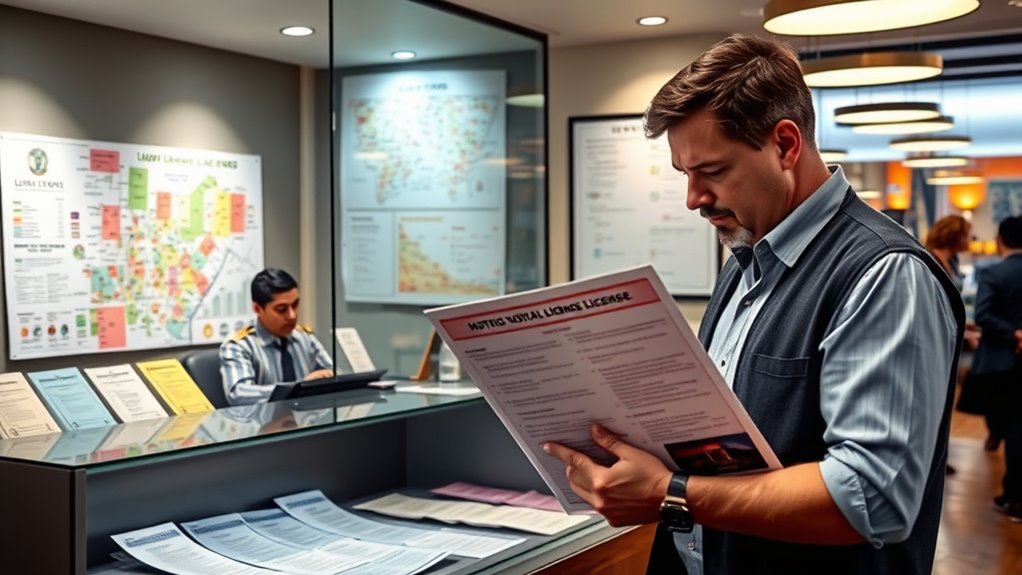
Guiding local regulations and licensing authorities can seem overwhelming, but knowing where to start is essential for legal compliance. First, identify which government agencies oversee liquor licensing in your area, such as city councils or state alcohol commissions. These agencies set specific rules, licensing requirements, and restrictions that you must follow. Take time to review their official websites and resources to understand local laws. Keep in mind that regulations can vary widely between jurisdictions, so don’t assume national standards apply everywhere. Building relationships with licensing officials can help clarify complex rules and ensure you’re on the right track. Staying informed about updates and changes is critical to maintaining compliance and avoiding penalties. Additionally, understanding the local liquor laws can help you better navigate the licensing process and ensure adherence to all relevant regulations. Ultimately, understanding your local authorities helps you navigate the licensing landscape with confidence.
The Application Process: Steps and Requirements
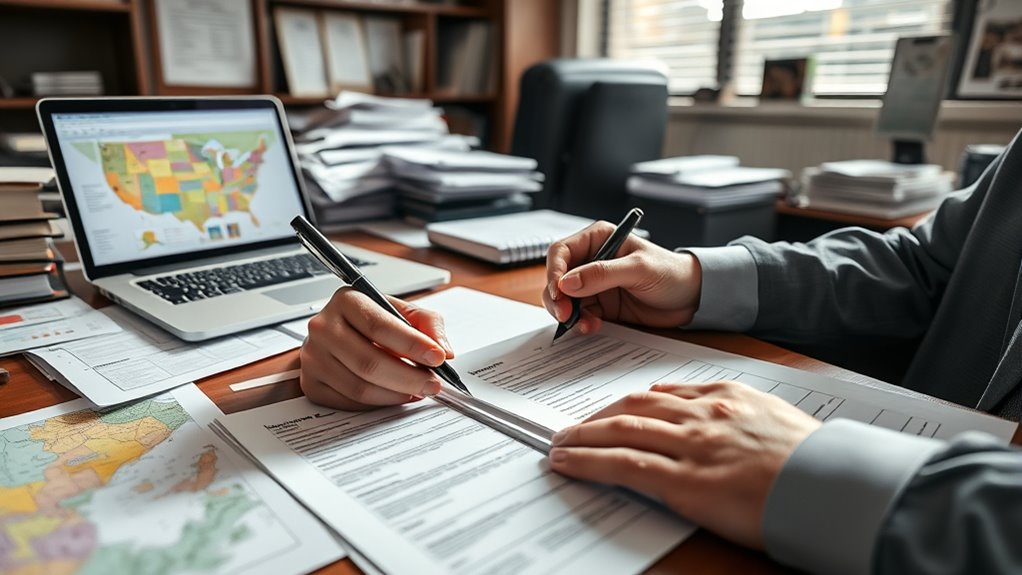
To successfully obtain a liquor license, you need to follow a clear set of steps and meet specific requirements. First, you’ll submit a detailed application to your local licensing authority, providing necessary documentation like proof of ownership or lease, and your business plan. You may also need to complete background checks and fingerprinting. Next, pay any required fees and attend an interview or hearing if scheduled. It’s important to guarantee your establishment complies with zoning laws, health codes, and safety regulations before applying. Some jurisdictions require community notifications or public hearings to gather local input. Additionally, understanding liquor-license compliance requirements can help prevent future legal issues. Finally, the licensing authority reviews your application, and if everything is in order, they approve and issue your license. Staying organized and thorough throughout this process increases your chances of success.
Common Compliance Challenges and How to Address Them
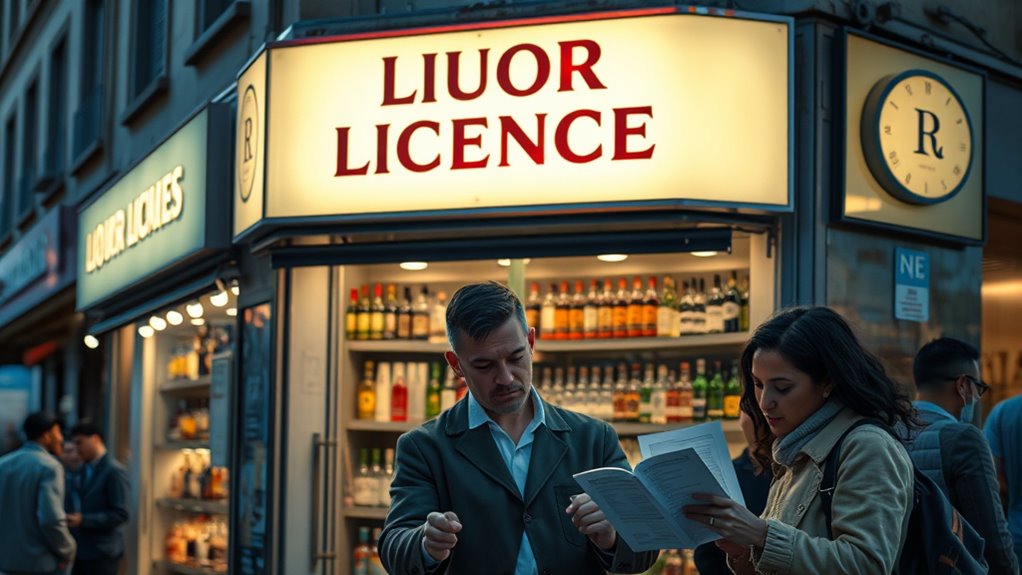
One of the biggest hurdles in maintaining liquor-license compliance is steering the complex and often changing regulations. You might struggle with keeping up-to-date on local, state, and federal rules, which can lead to unintentional violations. Common challenges include inconsistent record-keeping, serving minors, exceeding permitted hours, or over-serving patrons. To address these issues, establish regular staff training focused on legal requirements and responsible service. Implement clear checklists and procedures to ensure compliance during daily operations. Stay informed about regulatory updates by maintaining communication with licensing authorities. Conduct routine audits to spot potential violations early. Additionally, understanding the importance of cookies can help businesses manage online privacy policies that may impact customer trust and compliance. By proactively managing these challenges, you reduce the risk of fines, license suspension, or legal trouble, ensuring your business stays compliant and operates smoothly.
Responsible Serving Practices and Legal Obligations
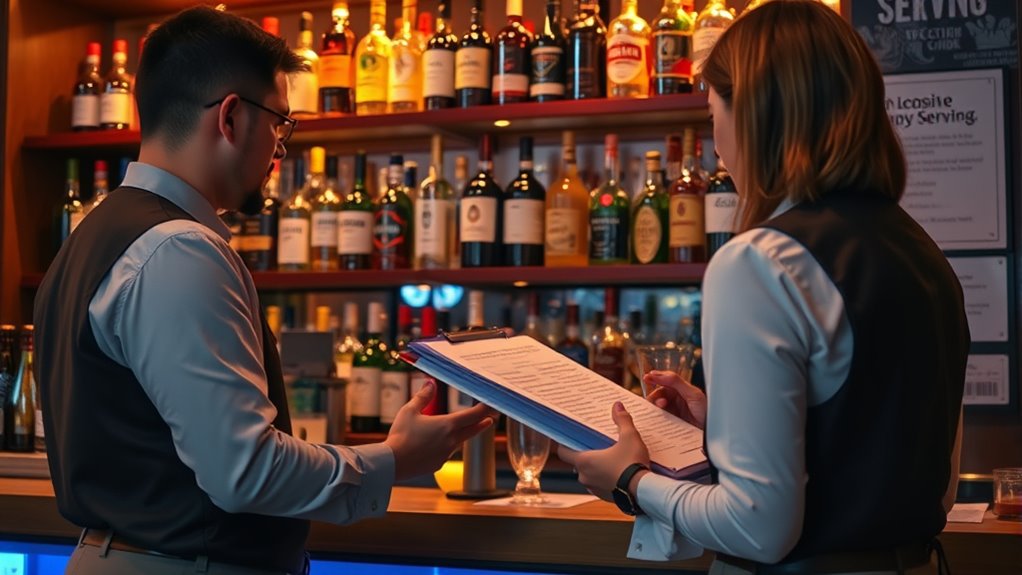
As a license holder, you’re responsible for ensuring patrons are served responsibly and legally. Recognizing signs of intoxication helps prevent over-serving, while strict age verification keeps you compliant with the law. Staying vigilant with these practices protects both your business and your community. Implementing responsible serving practices and understanding local regulations can further reduce risks and promote a safe environment for everyone.
Recognizing Intoxication Signs
Recognizing signs of intoxication is essential for responsible serving practices and fulfilling your legal obligations. When someone is intoxicated, they often display specific behaviors and physical cues. Being attentive helps you prevent over-serving and ensures customer safety. Look for these key signs:
- Slurred speech, unsteady balance, or difficulty walking
- Bloodshot or glassy eyes, or poor coordination
- Aggressive or overly emotional behavior
- Ice cream aversion can sometimes be observed if a person exhibits discomfort around dairy products, which may be an indirect sign of intoxication affecting their reactions.
Age Verification Procedures
Have you verified a customer’s age before serving alcohol? It’s your legal responsibility to do so. Always ask for valid ID from anyone who appears under 30 or if you’re unsure about their age. Accept only government-issued IDs like driver’s licenses, passports, or state IDs. Check the photo, date of birth, and expiration date carefully. Guarantee the ID isn’t expired or altered. Never accept photocopies or temporary documents. Remember, age verification isn’t just about legality; it’s about responsible service. If someone can’t produce valid ID or looks clearly underage, refuse service politely. Keeping accurate records of refusals isn’t mandatory but can protect you and your establishment if questions arise later. Prioritize verifying ages correctly to stay compliant and promote responsible alcohol serving practices. Proper age verification procedures help ensure compliance and support responsible serving practices.
Monitoring Changes in Local Laws and Renewing Licenses

Staying current with local laws and regulations is essential for maintaining a valid liquor license. Laws can change frequently, so you need to stay informed to avoid violations. Regularly review notices from local licensing authorities and subscribe to updates. Keep track of renewal deadlines to prevent lapses in your license. Consider setting reminders for key dates and requirements. Additionally, make sure your business complies with new rules by updating policies and training staff accordingly.
- Subscribe to local licensing authority updates
- Set calendar reminders for renewal deadlines
- Review and update policies in response to law changes
Penalties and Consequences of Non-Compliance
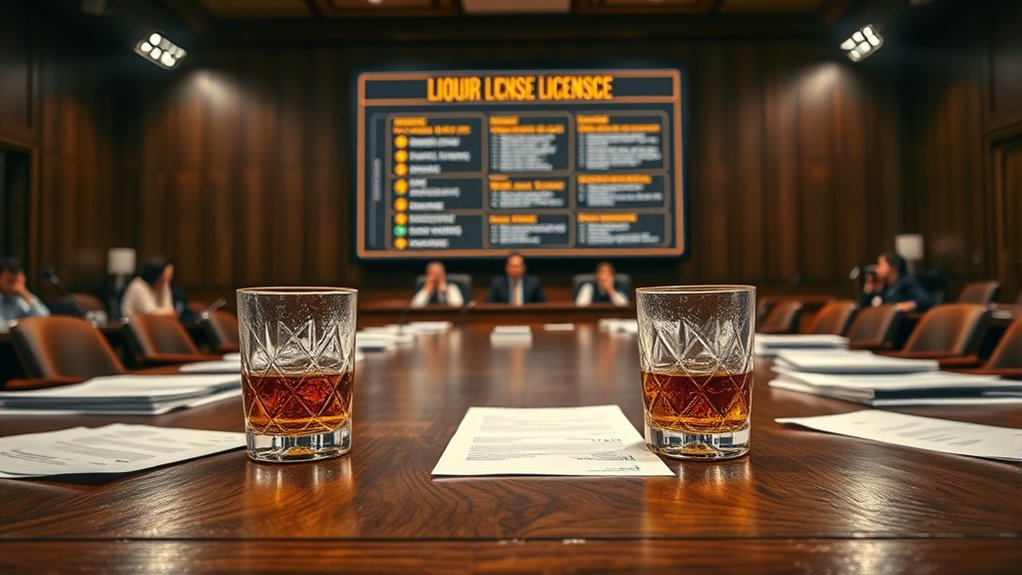
Failing to comply with local liquor laws can lead to serious penalties that jeopardize your business’s operations. You could face hefty fines, license suspension, or even license revocation, which can shut your doors permanently. The consequences extend beyond fines; legal actions or criminal charges might follow, damaging your reputation and trust with customers. To help you understand the risks, here’s a quick overview:
| Penalty Type | Examples | Impact |
|---|---|---|
| Financial Penalties | Fines up to $10,000 | Monetary loss, increased operating costs |
| License Suspension | Temporary loss of license | Reduced sales, customer dissatisfaction |
| License Revocation | Permanent loss of license | Business closure, legal troubles |
Frequently Asked Questions
How Often Do Liquor Licenses Need to Be Renewed?
You’re wondering how often liquor licenses need renewing. Typically, licenses are valid for one year, but this can vary depending on your location’s regulations. You should keep track of your renewal date to avoid lapses in your license. Many jurisdictions send reminders, but it’s your responsibility to renew on time. Check with your local licensing authority to confirm specific renewal periods and guarantee continuous compliance.
What Documents Are Required for License Application?
When applying for a liquor license, you need to gather specific documents. You’ll require a completed application form, proof of business ownership like articles of incorporation or partnership agreements, and a detailed floor plan of your establishment. Additionally, expect to provide identification, a background check consent, and possibly local permits or zoning approvals. Make sure all documents are current and accurate to guarantee a smooth application process.
Are There Specific Restrictions for Online Alcohol Sales?
Oh, sure, selling alcohol online sounds easy, right? Well, think again. You’ll face restrictions like age verification, shipping limits, and specific licensing requirements. Some areas even ban online alcohol sales altogether. You’ll need to comply with federal, state, and local laws, which can be a maze. So, before you start your e-commerce venture, make sure you understand these rules — or risk costly penalties and license revocations.
How Can Businesses Ensure Ongoing Compliance?
You need to stay updated on local laws and regulations to guarantee ongoing compliance. Regularly review your license requirements and stay informed about any changes in legislation. Implement strict age verification processes and train staff accordingly. Keep detailed records of all transactions and communicate with local authorities if questions arise. By proactively managing these aspects, you’ll maintain your license and avoid fines or penalties, ensuring your online alcohol sales remain compliant.
What Are the Common Reasons for License Suspension?
Imagine a once lively bar now silent, a sign of license suspension. You might face suspension for serving minors, over-serving patrons, or operating outside permitted hours. Failing to maintain proper records or ignoring mandated staff training also risks suspension. These issues create a shaky foundation, making it essential for you to stay vigilant. Regularly review your practices, stay updated on regulations, and guarantee compliance to keep your license active and your business thriving.
Conclusion
Staying compliant with local liquor laws is like tending a delicate garden—you need to stay alert and adapt as conditions change. When I first opened my bar, a small oversight almost cost me my license, but by staying informed and proactive, I kept it thriving. Remember, regular checks and understanding regulations aren’t just legal duties—they’re the roots that support your business’s growth. Nurture them, and your establishment will flourish in a landscape of trust and responsibility.









